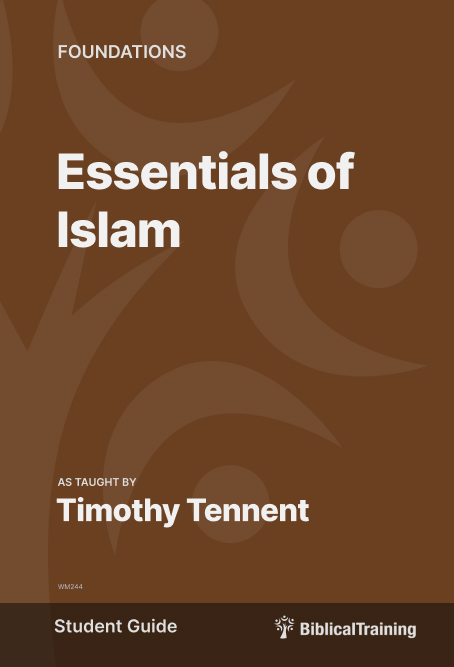Essentials of Islam
About This Class
In 6th-century Arabia, geography and culture shaped the emergence of Islam. Muhammad, after receiving revelations from Gabriel at 40, preached monotheism and recorded these in the Qur'an. Fleeing to Medina, he faced battles and established mosques. The Qur'an and Hadith are central texts, guiding Sharia law. Islam's divisions include Sunni, Shia, and Sufi. The religion’s principles, Da'wah and Jihad, have led to historical tensions and the rise of Islamic fundamentalism. Christianity and Islam differ significantly in theology, necessitating respectful, informed dialogue for effective Christian witness.
Recommended Reading:
The Koran, N.J. Dawood, trans., Penguin Books, 1983
Islam: The Straight Path, 3rd edition, John L....
Timothy Tennent

Lessons
- 0% Complete
In 6th-century Arabia, geography and culture shaped the emergence of Islam. Muhammad, once leading a normal life, at 40 claimed revelation from Gabriel about worshipping one "true" God, Allah. His Qur'an recorded further revelations. Destroying family idols, he fled to Medina with supporters, facing outnumbered battles. Muslim mosques built hold deep religious and historical value.
0% Complete - 0% Complete
The Muslims believe that the Qur'an is a divine revelation from God given directly to Muhammed beginning in about 610 a.d. The Five Pillars of the Islamic religion are the confession of faith, ritual prayer, almsgiving, fasting and pilgrimage.
0% Complete - 0% Complete
Muhammad's successors were call caliphs. From the beginning, there was disagreement about what characteristics would qualify someone to be a caliph. The four "Rightly Guided Caliphs" were in power in successive years from 632 to 661. The two major divisions in Islam are the Shia and Sunni Muslims. One of the major differences between these two movements was over how the successors to Muhammad would be determined. A third movement in Islam is known as Sufi.
0% Complete - 0% Complete
Along with the Qur'an, the Hadith is another source of revelation for the Muslim religion. The Hadith addresses many social and economic issues that come up in daily life. The Sunna is a collection of oral tradition about Muhammad, and the Hadith is a collection of narratives about Muhammad that are written. The Sunnis also have a provision for the community coming to a consensus about something new being agreed to as having equal authority with the Qur'an and Hadith. In the Shia community an Imam can declare something as revelatory truth. These components combine to make up Sharia law, which governs the Muslim community.
0% Complete - 0% Complete
If we look at this as an exegetical statement, we can see that from looking at the teachings of the Qur'an, Islam is not a religion that at its root, advocates peaceful propagation. If we look at this as a historical statement, Islam has not historically been a religion of peace, even though some of its followers may advocate living at peace with others. The two contradictory principles that exist in tension in the Muslim religion are Da'wah and Jihad.
0% Complete - 0% Complete
It is timely to explore the rise of Islamic fundamentalism and how that has resulted in the rise of Osama bin Laden and recent terrorist activities. An effective response to this movement will require a Christian presence among Muslims around the world.
0% Complete - 0% Complete
Islam and Christianity have major theological differences including their view of Scripture, the nature of God, who Jesus is and what is required for salvation. There are specific strategies that can help us witness to Muslims genuinely and effectively.
0% Complete
Class Resources
Recommended Books
Essentials of Islam - Student Guide
This course serves as a summary of the beliefs and practices of Islam. There are seven messages that will introduce readers to the historical context, key tenents of the...
